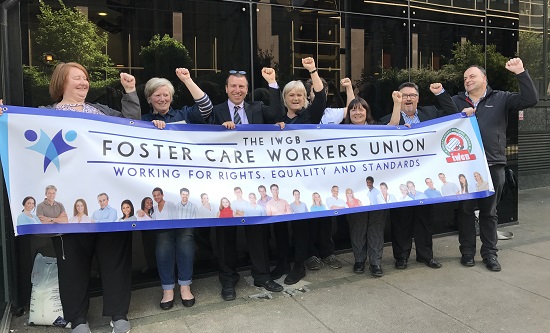
On 1 August 2017 in a landmark case an employment tribunal in Scotland ruled that a married couple working as foster carers were not self-employed or volunteers but employees of Glasgow City Council, and that foster carers were therefore entitled to workers’ rights. This victory has been a huge achievement for the Foster Care Workers’ Branch of the Independent Workers Union of Great Britain (IWGB), and part of the union’s general struggle for the rights of casual and other marginalised workers. However, many foster carers are still denied many of the rights that this ruling is supposed to secure.
As well as the tribunal, a cross-party parliamentary review of the rights of foster carers was set up, and it gave vocal support for the rights of foster carers. However, these words proved to be empty as councils across the country continue to deny foster carers even the most basic of workers’ rights.
The main problem facing foster care workers is that they are not recognised as employees by the councils or fostering agencies they work for and therefore can lose their jobs over the slightest disagreement with their employer – and they have plenty to disagree about.
Foster care is the only industry where your employer has control over your licence to practice, meaning that your employer can not only put you out of the job but can also prevent you ever getting a job as a foster carer ever again. Foster carers are also paid very little, while all foster carers receive an allowance to cover the cost of raising the child and some receive a fee for their time and expertise which makes pay a postcode lottery.
While for the purposes of tax foster carers are recognised as self-employed, they have none of the freedoms such as being able to control working hours or send for a substitute in their place.
Foster carers are often kept out of the loop on decisions that affect them, from matters of policy that could affect whether they have a job in six months’ time to decisions about the future of children they’re looking after. The councils and agencies that make these decisions don’t treat foster carers with the respect they deserve and will have someone unrelated to the situation without all the relevant input making life-changing decisions about a child’s life.
Most shockingly of all, foster carers are often victims of false accusations that are hard to disprove. It’s usually those who speak up against their employers who are targeted with such accusations and they are blacklisted from becoming a foster carer on a guilty until proven innocent basis.
The way foster carers are treated inevitably affects the children and young people they look after. The poor pay affects living standards and having important information about their future kept from them means these children lack security and certainty.
These problems are hardly surprising when looked at in the context of the deepening crisis of capitalism. As Tory and Labour councils alike make cuts they will first target the services where they think there won’t be any push back. The foster carers union has only been going since 2016 but now that membership is growing they will be able to build effective resistance.
To fight back against these injustices the foster carers workers’ union has made two demands. The first is to demand ‘Limb (b) workers status’, a legal term which means that they will be recognised as workers of their agency or council, entitling them to claim for unpaid wages, holiday pay and sick pay. The second demand is for a central register of foster carers that takes the power to blacklist foster carers away from a carer’s employer. The RCG stands with the foster care workers in their struggle for workers’ rights and against the anti-worker practices that most professions outlawed in Britain years ago.
Duncan Murray
To find out more about the Foster Care Workers’ Branch, visit the IWGB website:




